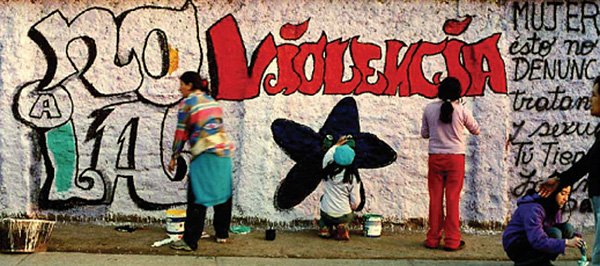 |
 |
 |
 Editorials | Issues | October 2007 Editorials | Issues | October 2007  
Female Murders in Mexican Town Hidden for Years
 NewKerala.com NewKerala.com
go to original


| On Wednesday, the European Parliament demanded that Mexico and Central American countries give women better protection from violence. Across the region, women are murdered more than anywhere else in the world.

|
Ciudad Juarez - Every day thousands of people, cars, trucks and trains pass through the Mexican town Ciudad Juarez's six border crossings to the US, while 300 international companies have set up so-called maquila factories - assembly plants that supply the American market.

But Ciudad Juarez owes its international renown to a terrible, sad fact: a total of 393 women have been murdered in the border city between 1993 and 2007. It is known as "the global capital of feminicides."

Mayor Hector Murguia Lardizabal does not like to discuss it with foreign visitors, and he would rather ignore the fact that even the European Parliament has taken up the issue.

He prefers to stress the positive aspects of "our beloved Juarez" - industry, cross-border traffic, plentiful tax income, international investment, and seemingly unlimited growth.

The city grows by 60,000 people every year. Forty years ago Ciudad Juarez was a town of 20,000, but 1.6 million people live there today. Across the border in El Paso, Texas, there are only 700,000.

"We're first in everything," Murguia told a group of visiting legislators of the German Bundestag.

Every two years, these legislators in charge of relations with Mexico travel to the North American country to keep up the contact with their Mexican colleagues.

This year they wanted to find out more about the feminicides.

On Wednesday, the European Parliament demanded that Mexico and Central American countries give women better protection from violence. Across the region, women are murdered more than anywhere else in the world.

The European Parliament demanded that these countries end gender inequality and prevent violence against women with all their might.

It was only a few years ago that the authorities tackled the issue, under pressure from international public opinion.

The new leadership of the state of Chihuahua under Governor Jose Reyes Baeza Terrazas started to shed light on the brutal acts as most of the aggressors remained at large. In the whole of Chihuahua there was not a single police laboratory, no modern forensic medicine.

Even today, despite the new labs and more professional police and investigative work, 126 cases remain unsolved.

For a long time, impunity contributed to the increase in murders over time, most of them within family circles or in connection to drug crime and juvenile gangs.

"Men think they can dispose of their wives as if they were their property," said state Attorney General Patricia Gonzalez. "This is the worst form of murder in Mexico, there is an unimaginable hatred and disdain for women."

Many young women and girls, most of who migrated to the border city from the south to work in the maquilas, were victims of this violence and were murdered. Their bodies were found near the factories, on garbage dumps or in the desert - raped, strangled, mutilated.

One attacker admitted that he and his friends, under the effect of drugs, abducted women one weekend, raped and murdered them.

The desperation of the families is huge. They have the feeling that the authorities do not listen to them - the poor "morenos", or dark-skinned people, from the south.

Until 2004, not one case had been solved, though innocent people were tortured into making confessions, and then jailed. Mothers seeking their missing daughters were told that the women had probably crossed the border to the US illegally without telling their families.

"We got started particularly by fighting impunity, through the professionalisation of police work," Attorney General Gonzalez said of the efforts since 2004.

However, the authorities continue to give the impression that it is best to sweep the phenomenon under the carpet. Leopoldo Gonzalez Baeza, chairman of the state human rights commission, thinks the whole issue is a product of exaggeration by the media.

"We have the whole world against us, even Jennifer Lopez," he complained.

The US actress of Puerto Rican descent starred in the 2006 film Bordertown, about the killings in Ciudad Juarez.

In the meantime, scores of women continue to demand justice. Irma Perez, whose daughter was murdered in 1995, no longer trusts official reports on the success of the investigations. In her daughter's case, one suspect was arrested and then released again.

"There is no investigation, for four months there has been silence," she said. "Really they just don't want anything to do with me anymore." | 
 | |
 |



